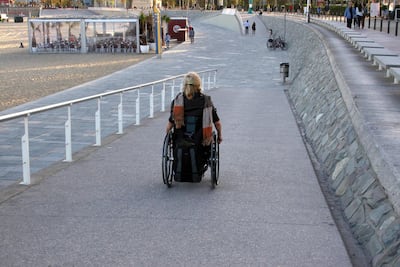Employers are shying away from hiring people with disabilities because they incorrectly believe it leads to expensive modifications and increased absenteeism, a survey on inclusion has revealed.
More than 75 human resource managers from government and private sectors were interviewed for the study, commissioned by Emirates NBD, that aimed to identify employers’ perceptions and tackle fears about hiring staff with special needs.
Respondents said they were deterred because they believed business would be harmed and that people with disabilities would not perform well because their limits. Some said they considered people with disabilities to be the government’s responsibility.
The study also included case studies from companies who have employed people with special needs, to dispel misconceptions.
“The findings showed that while nine out of 10 employers were completely satisfied with people with disabilities they had employed, employees were not sure how to deal with them as colleagues and so were polite but remained distant,” said Murray Stanford, senior account manager with Ipsos, the market research company that conducted the study.
It showed that workplace interactions are crucial as are correctly matching jobs with the skills of candidates, workshops for employees on inclusion and coaching to help the newcomers gain confidence.
For years, the UAE government has promoted inclusion at work and in schools. Families are offered support with better healthcare facilities and early intervention programmes so disabled children can improve their skills and have a better chance of employment after graduating.

Heads of retail, banking and cosmetics companies gathered in Dubai yesterday to debunk myths held by employers and to call for more companies to hire people with disabilities.
Deepak Malathi, head of human resources at clothing retailer Splash, rejected the notion that a person’s disability would cause them to take more sick days. He said his staff had to convince a person with special needs to go on leave.
“When asked why he didn’t take time off, he simply said that while the others took on a job for money, this work was his life and was the reason he got out of the house every morning,” Mr Malathi said.
Nine people with disabilities are employed in the company’s UAE stores.
“They are on the shop floor and do a sales job like other staff,” Mr Malathi said. “Customers are supportive and the interaction is great. Employing people with disabilities cannot negatively impact business. We are just starting to create change and have a long way to go.”
Fatima Abdulrahman, chief human resources officer with Tanfeeth, a subsidiary of Emirates NBD, said it was not expensive to design lifts and toilets, or to assign parking close to the entrance to make offices inclusive.
“These are minimal costs. What is important is how motivated and passionate they are about work and this energy spreads across to everyone. The whole perception of how people view disability as a barrier is what we need to overcome,” she said.
Tanfeeth employs 26 people with disabilities and plans to raise this to 30 by the year-end in jobs across call centre, communications, payments and treasury that it handles for the bank.
Hussain Al Maseeh, an expert on social development with the government Community Development Authority, said recruiters should first understand that there was no specific job profile.
“It will not work if you have one job in mind. We need to look at what the employee is capable of doing and conduct a thorough assessment like you would do for any candidate. Keep them moving through five or six internships so you can evaluate what they are good at,” he said.
This was in response to feedback from aid workers that limited work such as filing and copying paperwork is usually assigned to people with special needs.
_______________
Read more:
Call for volunteers to join campaign to make Dubai more wheelchair friendly
Top UAE swimmer defies doctor who said he would never amount to anything
World’s largest accessible library reaches out to visually impaired in UAE
_______________
Yassine Bakkari, operations director with L’Oreal Middle East, said recruitment was the first step and the key was to create a culture in which people feel they belonged.
“Our ambition is also how to empower people with disabilities to achieve their potential and change the perceptions of people in our own team,” he said.
The company has seven disabled people on staff and aims to raise this to a dozen by December.
“We are not doing this for quotas or to reach figures. We believe it’s the right thing to do. It’s our duty.”
Emirates NBD launched a career network two years ago to assist organisations to take on people with disabilities and has a database of individuals that it has screened and provided training across the UAE.
Insurance firms, advertising companies, hotels and retail stores have hired from the bank’s database of individuals across the country with 50 candidates gaining employment in 19 companies.

